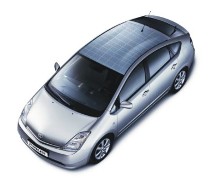Toyota has announced modifications to its Prius hybrid to make it more fuel efficient and luxurious than before.
The new version of the vehicle will come equipped with remote control air conditioning, LED headlights and solar panels.
It will feature an intelligent parking system and ‘lane-keeping assist’, which helps prevents motorists straying out of their lane.
Prius III features solar panels
 The new Prius boasts new styling and what Toyota claims is the “cleanest aerodynamic profile of any mass-produced vehicle in the world”. The car’s new slippery lines help it return a claimed 72.4mpg – an improvement on the claimed 65.7mpg of the current model.
The new Prius boasts new styling and what Toyota claims is the “cleanest aerodynamic profile of any mass-produced vehicle in the world”. The car’s new slippery lines help it return a claimed 72.4mpg – an improvement on the claimed 65.7mpg of the current model.
Drivers can choose between ‘EV-Drive mode’, which allows the car to be driven on battery power alone for about a mile, ‘power mode’, which gives the car a sportier feel or ‘eco mode’ to deliver maximum fuel efficiency.
One of the features on the long options list is a bank of roof-mounted solar panels that power a new battery-powered ventilation system to cool down the car after it has been parked in the sun.
Stiff competition for the Prius
The Toyota Prius is facing stiff competition from a new hybrid built by rival car maker Honda.
Last month the Honda Insight was the best selling car of its size in Japan, the first time that a hybrid vehicle has held top spot during a monthly sales period.
According to figures from the Japan Automobile Dealers Association, 10,481 Honda Insight cars were bought, taking its total sales for the last three months to more than 19,000.
The main reason for the healthy sales is the price of the Honda. A basic Toyota Prius costs almost £18,000; the equivalent Insight is £15,490.
A spokesperson for the Environmental Transport Association (ETA) said: “Hybrid cars continue to improve, but today’s examples face stiff competition in terms of fuel economy and emissions from the latest diesel vehicles.”
How green are hybrid cars?
 The Honda Insight can run on battery power or a conventional petrol engine giving average emissions of 101g/CO2 per kilometre. Whilst there is much to be said for the ability of hybrids to run silently and without exhaust emissions in urban areas, a new generation of diesel cars now produces less CO2.
The Honda Insight can run on battery power or a conventional petrol engine giving average emissions of 101g/CO2 per kilometre. Whilst there is much to be said for the ability of hybrids to run silently and without exhaust emissions in urban areas, a new generation of diesel cars now produces less CO2.
For example, the Ibiza Ecomotive 1.4 TDI 80PS features a Diesel Particulate Filter (DPF) that minimises particulates and helps reduce CO2 emissions to 99 g/km and offers a fuel economy of 74.3 mpg, a better figure than the Honda Insight’s 65mpg.
Furthermore, hybrid cars rely on batteries that need to be replaced periodically. Although they can be recycled, they are not regarded as environmentally friendly to manufacture.
What is the ETA?
The ETA provides motorists and cyclists with carbon-neutral breakdown cover and insurance products.
0 Comments View now